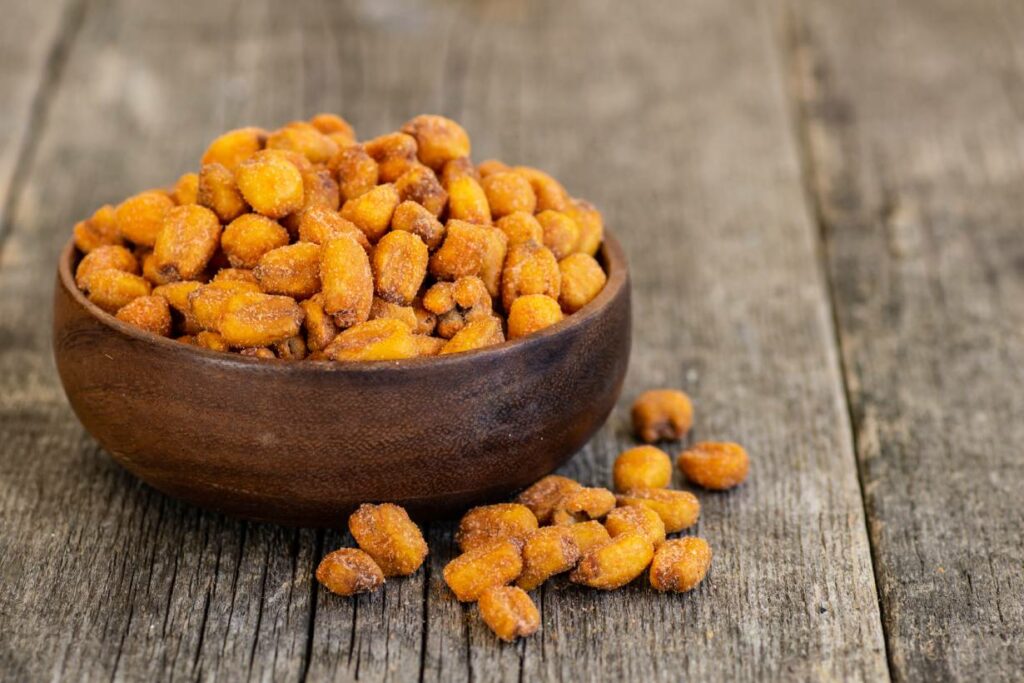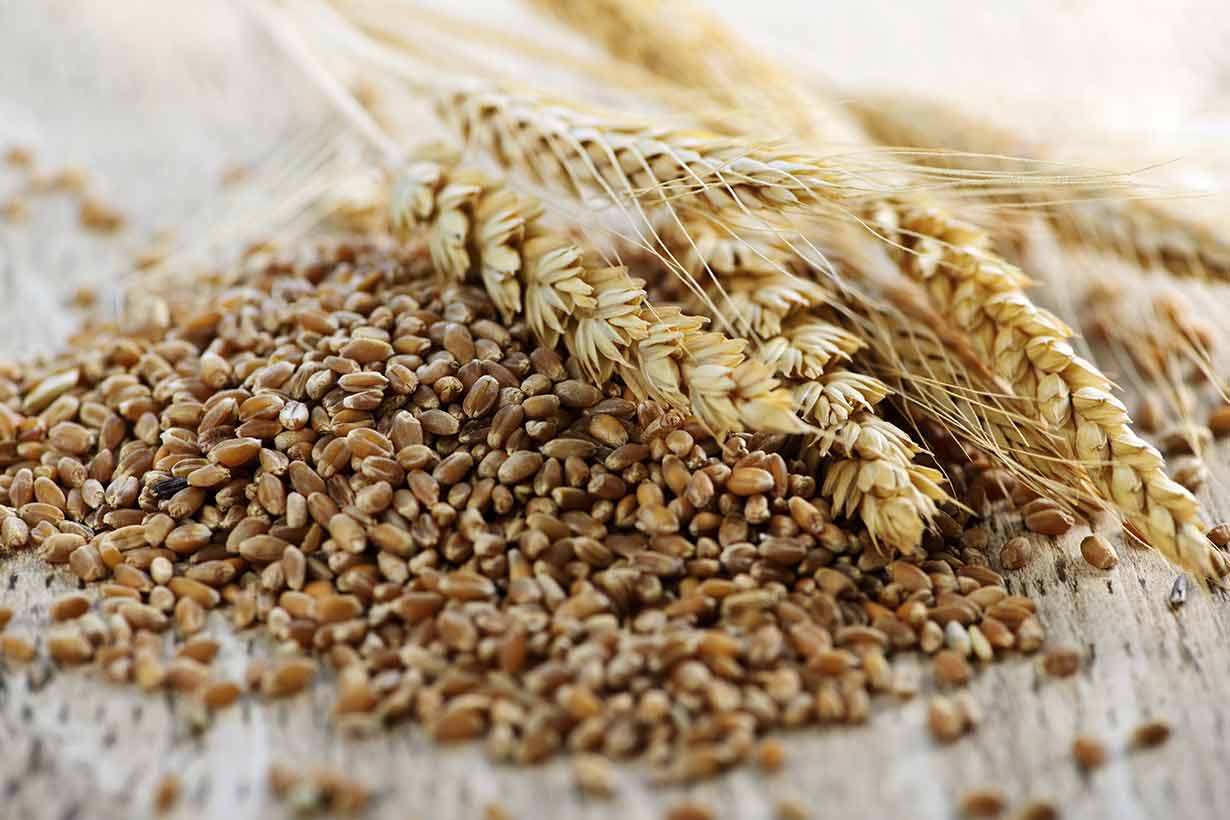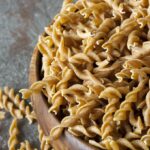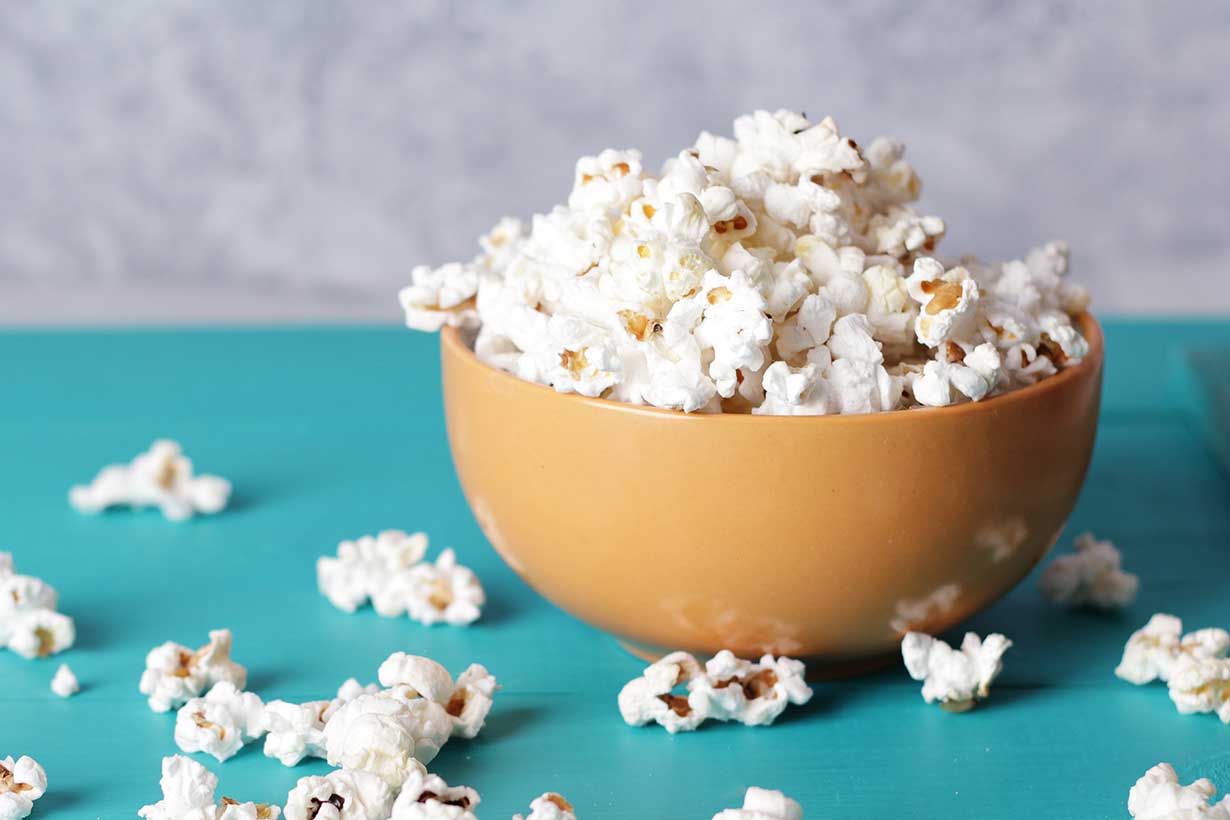Corn nuts are a popular snack product, but are they a nutritious choice or a snack better limited?
This article examines corn nuts’ ingredients, characteristics, and nutritional properties.
Table of contents
What are corn nuts?

Corn nuts are a snack product first introduced in the United States in 1936 (1).
This first product had a brand name that came to be known as ‘CornNuts.’
The ‘Corn Nuts’ product is still selling today, and numerous companies worldwide make similar products. In this regard, other common names include ‘toasted corn’ and ‘crunchy corn.’
Production of corn nuts typically involves just three ingredients: whole-grain corn, oil, and salt.
However, there are also flavored products available that may include additional ingredients for seasoning.
This article will focus on the original Corn Nuts product and its nutritional values.
Ingredients
Original corn nuts contain three ingredients (2):
- Whole-grain waxy kernels
- Corn oil
- Salt
How are corn nuts made?
The production process of corn nuts is relatively simple (3, 4):
- Firstly, whole waxy corn kernels are soaked in water to rehydrate.
- The kernels are then deep-fried until they develop a hard and crunchy texture. However, depending on the specific brand and product, a roasting process is sometimes used instead of deep-frying. It is thought that deep-frying gives corn nuts better taste characteristics.
- After the deep-frying stage, the corn nuts are salted and packaged for distribution.
What nutritional values do corn nuts have?
Based on USDA nutritional data, the following tables show the nutrition facts for a medium single-serving (57-gram) bag of corn nuts (5).
Daily values (% DV) have been calculated using USDA data and the FDA’s daily values (5, 6).
| Name | Amount | % Daily Value |
|---|---|---|
| Calories | 254 kcal | |
| Carbohydrates | 41.0 g | 14.9% DV |
| Fiber | 3.93 g | 14.0% DV |
| Sugars | 0.35 g | |
| Fat | 8.89 g | 11.4% DV |
| Saturated | 1.38 g | 6.9% DV |
| Monounsaturated | 5.39 g | |
| Polyunsaturated | 1.74 g | |
| Omega-3 | 0.03 g | |
| Omega-6 | 1.72 g | |
| Protein | 4.84 g | 9.7% DV |
| Cholesterol | 0 mg | 0% DV |
Vitamins
| Vitamin | Amount | % Daily Value |
|---|---|---|
| Choline | 11.7 mg | 2.1% DV |
| Folate, DFE | 0 mcg | 0% DV |
| Vitamin A, RAE | 0 mcg | 0% DV |
| Vitamin B1 (thiamin) | 0.023 mg | 1.9% DV |
| Vitamin B2 (riboflavin) | 0.074 mg | 5.7% DV |
| Vitamin B3 (niacin) | 0.963 mg | 6.0% DV |
| Vitamin B6 (pyridoxine) | 0.131 mg | 7.7% DV |
| Vitamin B12 (cobalamin) | 0 mcg | 0% DV |
| Vitamin C | 0 mg | 0% DV |
| Vitamin D | 0 mcg | 0% DV |
| Vitamin E | 0 mg | 0% DV |
| Vitamin K | 5.3 mcg | 4.4% DV |
Minerals
| Mineral | Amount | % Daily Value |
|---|---|---|
| Calcium | 5.13 mg | 0.4% DV |
| Copper | 0.066 mg | 7.3% DV |
| Iron | 0.95 mg | 5.3% DV |
| Magnesium | 64.4 mg | 15.3% DV |
| Phosphorus | 157 mg | 12.6% DV |
| Potassium | 158 mg | 3.4% DV |
| Selenium | 8.44 mcg | 15.3% DV |
| Sodium | 321 mg | 14.0% DV |
| Zinc | 1.02 mg | 9.3% DV |
Benefits of corn nuts
The main advantages of corn nuts relate to their nutrient profile and nutritional value compared to other snack options.
- Although corn nuts are processed, they still contain whole-grain corn kernels. Corn nuts have higher nutritional value than snack products made with refined grains because they are made with intact whole grains.
- Corn nuts are relatively high in fiber, with a 57-gram single-serve bag providing 3.93 grams, 14% of the daily value.
- They provide a small-to-moderate amount of protein at 4.84 grams per bag, nearly 10% of the daily value.
- Corn nuts also provide a good range of vitamins and minerals, with a 57-gram serving providing more than 10% of the daily value for magnesium, phosphorus, and selenium. Furthermore, they offer more than 5% of the daily value for vitamins B2, B3, and B3 and copper, iron, and zinc.
- Corn nuts supply fiber, protein, and some essential vitamins and minerals. This being the case, they are a better snack option than candy and other sugary products.
Downsides of corn nuts
Corn nuts also have some potential downsides.
- High in calories: corn nuts are a relatively high-calorie snack, and they can be easy to over-consume. On this note, several different-size products with varying calorie content are available. A ‘small single serving bag’ (28g) has 125 calories, a ‘medium single serving bag’ (57g) has 254 calories, and a ‘large single serving bag’ has 379 calories (5).
- Moderately high in sodium: with a 57-gram ‘medium single serving bag’ containing 321 mg of sodium, corn nuts have a relatively high sodium content. 321 mg is 14% of the recommended daily value of 2300 mg sodium (5, 6). While sodium is an essential mineral, many people consume it in excessive quantities, which can lead to increased blood pressure (7, 8).
- Corn nuts are typically deep-fried. We can make some direct observations about deep-fried food, such as its higher calorie density compared to foods cooked by other methods. Additionally, there may be potential adverse health effects from consuming deep-fried food. For instance, several large observational studies have found that higher fried-food consumption is associated with an increased risk of cardiovascular disease and cardiovascular mortality (9, 10, 11).
What are some healthier alternatives to corn nuts?
Popcorn is probably the most similar ‘healthier alternative’ to corn nuts. However, it depends on the specific type of popcorn.
For example, plain air-popped corn differs nutritionally from oil-popped popcorn with added sugars.
See this complete guide to popcorn for more information.
Some other healthy snack options that don’t have the same downsides as corn nuts include:
- Nuts
- Trail mixes with fruit, nuts, and dark chocolate
- Whole corn on the cob
- Roasted corn nuts (rather than deep-fried)
Common questions about corn nuts
To answer any further queries, here are some answers to people’s common questions about corn nuts.
No, corn nuts are made with corn, oil, and salt. They do not contain real nuts.
Since corn nuts do not contain real nuts, the product should suit people with nut allergies. However, as with all packaged foods, some commercial products are made in factories that produce several different products, and cross-contamination can sometimes be possible. If this is the case, the product might have a “may contain” or “produced in a facility…” warning on the packaging, which is worth checking for (12).
Corn nuts can play a part in an overall healthy dietary pattern. However, they are high in calories, sodium-rich, and there are healthier dietary choices. Thus, it is probably better to limit their intake.
Regular corn nuts contain no animal-based ingredients and are thus suitable for a vegan diet. However, it is worth checking any flavored corn nut-style products to ensure they don’t have ingredients like milk powder or lactose.
Since ketogenic (keto) diets are characterized by low-carbohydrate content, corn nuts are not keto-friendly. Corn nuts are moderately high in carbohydrates, so they are unsuitable for a ketogenic diet.
Where To Buy
Corn nuts should be available in any large grocery store or supermarket.
A wide variety of corn nut products is also available on Amazon (disclosure: affiliate link).
Final thoughts
Corn nuts are a snack product that offers moderate nutritional value with a combination of fiber, protein, vitamins, and minerals.
They are also more nutritious than a lot of ultra-processed snack products which are available.
However, they are high-calorie, high in sodium, and deep-fried, with healthier alternatives available.
Some people may enjoy consuming corn nuts. However, it is probably better to limit their intake to occasional times.








